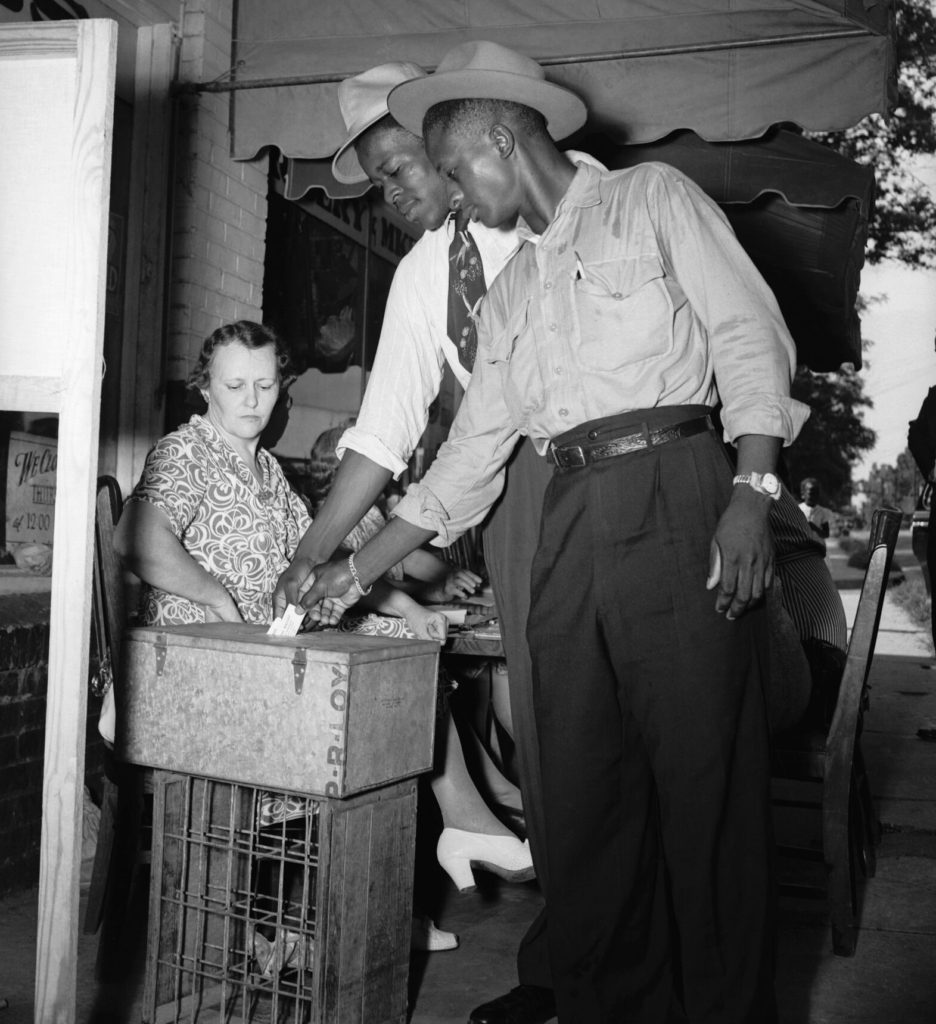How Has the Electoral College Survived for This Long?

Voters casting ballots in Mississippi in 1946 (Credit: Bettmann Archive/Getty Images)
Resistance to eliminating it has long been connected to the idea of white supremacy
By
As our revived national conversation on race has made clear, the legacies of slavery and white supremacy run wide and deep in American society and political life. One such legacy — which is particularly noteworthy in a presidential election season — has been the survival and preservation of the Electoral College, an institution that has been under fire for more than 200 years. Our complicated method of electing presidents has been the target of recurrent reform attempts since the early 19th century, and the politics of race and region have figured prominently in their defeat.
It is, of course, no secret that slavery played a role in the original design of our presidential election system — although historians disagree about the centrality of that role. The notorious formula that gave states representation in Congress for three-fifths of their slaves was carried over into the allocation of electoral votes; the number of electoral votes granted to each state was (and remains) equivalent to that state’s representation in both branches of Congress. This constitutional design gave white Southerners disproportionate influence in the choice of presidents, an edge that could and did affect the outcome of elections.
Not surprisingly, the slave states strenuously opposed any changes to the system that would diminish their advantage. In 1816, when a resolution calling for a national popular vote was introduced in Congress for the first time, it was derailed by the protestations of Southern senators. The slaveholding states “would lose the privilege the Constitution now allows them, of votes upon three-fifths of their population other than freemen,” objected William Wyatt Bibb of Georgia on the floor of the Senate. “It would be deeply injurious to them.”
What is far less known, or recognized, is that long after the abolition of slavery, Southern political leaders continued to resist any attempts to replace the Electoral College with a national popular vote. (They sometimes supported other reforms, like the proportional division of each state’s electoral votes, but those are different strands of a multifaceted tale.) The reasoning behind this opposition was straightforward, if disturbing. After Reconstruction, the white “Redeemer” governments that came to power in Southern states became the political beneficiaries of what amounted to a “five-fifths” clause: African-Americans counted fully toward representation (and thus electoral votes), but they were again disenfranchised — despite the formal protections outlined in the 15th Amendment, ratified in 1870, which stated that the right to vote could not be denied “on account of race, color, or previous condition of servitude.” White Southerners consequently derived an even greater benefit from the Electoral College than they had before the Civil War.
By the 1940s, many Southerners also came to believe that their disproportionate weight in presidential elections, thanks to the Electoral College, was a critical bulwark against mounting Northern pressures to enlarge the civil and political rights of African-Americans. In 1947 Charles Collins’s “Whither Solid South?,” an influential states’ rights and segregationist treatise, implored Southerners to repel “any attempt to do away with the College because it alone can enable the Southern States to preserve their rights within the Union.” The book, which became must reading among the Dixiecrats who bolted from the Democratic Party in 1948, was highly praised and freely distributed by (among others) the Mississippi segregationist James Eastland, who served in the Senate from 1943 until 1978.
Driven by such convictions, the white supremacist regimes of the South stood as a roadblock in the path of a national popular vote from the latter decades of the 19th century into the 1960s, when the Voting Rights Act and other measures compelled the region to enfranchise African-Americans. There was, of course, resistance to the idea of a national vote elsewhere in the country, but it was the South’s well-known adamance — and the fact that Southern states alone could come close to blocking a constitutional amendment in Congress — that kept the idea on the outskirts of public debate for decades. Numerous political leaders who personally favored a national popular vote, like Senator Henry Cabot Lodge, Jr. of Massachusetts, a Republican, in the 1940s, concluded that such a reform had no realistic chance of success, and they shifted their advocacy to less sweeping measures.
The politics of race and region also figured prominently in the stinging defeat of a national popular vote amendment in the Senate in 1970 — the closest that the United States has come to transforming its presidential election system since 1821. Popular and elite support for the idea had mushroomed in the 1960s, leading in 1969 to the House of Representatives voting overwhelmingly in favor of a constitutional amendment that would have abolished the Electoral College. The proposal then got bogged down in the Senate during a year when regional tensions were high: two Southern nominees to the Supreme Court were rejected by the Senate, and the Voting Rights Act was renewed over the vocal opposition of Southern senators. Meanwhile, the national popular vote amendment was stalled in the Judiciary Committee, which was chaired by none other than Senator Eastland.
When the amendment resolution finally came to the floor of the Senate in September 1970, thanks to the prodigious efforts of an Indiana senator, Birch Bayh, it was greeted by a filibuster led by segregationists Sam Ervin and Strom Thurmond (with an assist from the Nebraska Republican Roman Hruska). Although things were changing in the South, its political leaders remained steeped in the values and perspectives that had informed their hostility to the civil rights movement and the Voting Rights Act. “The Electoral College,” wrote Senator James Allen of Alabama in 1969, “is one of the South’s few remaining political safeguards. Let’s keep it.”
The filibuster succeeded, dooming the proposal: attempts to invoke cloture — to end the debate and vote on the amendment itself — fell a few votes short of the two-thirds majority then needed to break a filibuster. The regional lineups in the crucial cloture votes (there were two) were starkly visible. More than 75 percent of Southern senators voted against cloture; a similar proportion of senators from outside the South voted favorably.
Southern political leaders, shaped by segregation and white supremacist beliefs, thus kept the idea of a national popular vote off the table for many decades and played a crucial role in blocking its passage through Congress at a historical juncture when change actually seemed possible. To be sure, electoral reform is almost always a complex, difficult process, with diverse actors competing to defend their ideas and interests. But had the politics of race been less salient, both in the 19th century and the 20th, the Electoral College would most likely have been relegated long ago to the status of a historical curiosity. We might want to keep that sobering fact in mind as we look ahead to an election whose outcome is in question only because of the peculiar manner in which we choose our presidents.
* Alexander Keyssar (@AlexKeyssar), a professor of history and social policy at Harvard, is the author of “Why Do We Still Have the Electoral College?” and “The Right to Vote: The Contested History of Democracy in the United States.”
** Originally published at The New York Times, Aug 3, 2020. This article does not necessarily reflect the opinion of OPEU or INCT-INEU.





















